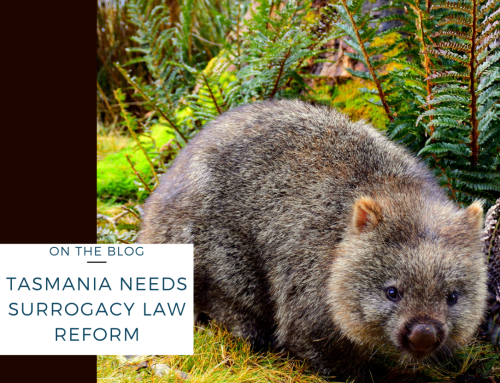Surrogate Bodily Autonomy. What exactly do we mean when we talk about the surrogate having bodily autonomy?
If you are new to surrogacy as an intended parent, you might like to start with this post. If you are a potential future surrogate, this post provides some information.
I’ve written a book, More Than Just a Baby: A Guide to Surrogacy for Intended Parents and Surrogates, the only guide to surrogacy in Australia.
A surrogate is just like any other person, and can make decisions about her body just as any other person can. This is the case even when she is pregnant, and even when the baby is not intended to be raised by her and does not share her genetics. A pregnant person can determine what happens to their body, whether it is a particular treatment or what food they eat. There is no law that restricts a person’s bodily autonomy, even if it means they might abuse their body with drugs or alcohol. A pregnant person can determine whether or not to continue the pregnancy, and how they are cared for in pregnancy and birth.
Everyone should have the right to grow their family either by carrying a baby themselves or pursuing surrogacy. We should legislate for social surrogacy across Australia.
When it comes to surrogacy, a surrogate bodily autonomy does not change, even though she has intentionally fallen pregnant for the intended parents, and with their embryo. The team needs to discuss their expectations about what treatments she will undergo, and how she will manage the pregnancy. Will she drink alcohol, eat soft cheese, go skydiving whilst pregnant? There are no rules, but surrogates will generally treat the pregnancy and the baby much the same as if she were pregnant with her own child. Surrogates are not interested in placing the baby at risk, and will follow the recommendations of her treating medical practitioner. But if there are differences between the surrogate and the intended parents about how she will manage the pregnancy, it is best to work through those issues prior to conception. If there are disagreements about anything to do with how the surrogate will manage the treatment, pregnancy or birth, ultimately the surrogate can make the final decision.
Termination of pregnancy
Where the surrogate bodily autonomy can have the most impact is the issue of pregnancy termination. The team should talk about their views on termination prior to entering into the arrangement, and discuss the circumstances where they may consider a termination. The team needs to understand each others’ views and ensure they have discussed what may happen if they disagree. Ultimately, no one can force a surrogate to terminate a pregnancy, and neither can they force her to continue a pregnancy against her will.
Whilst the surrogate bodily autonomy is a legal matter, it is not a good idea to rely on lawyers to resolve any disputes between the parties. If the team is in disagreement about the surrogate’s conduct during pregnancy, the primary concern should be about salvaging the relationship between the parties and seeking counselling for support. Calling lawyers to resolve any disputes is unlikely to lead to a better outcome for the relationships.
If you are an intended parent and you find it difficult to relinquish control to your surrogate, that is understandable. The person who is carrying your baby can make the final decision about whether she drinks, smokes or eats terrible food. You need to work through your anxieties about this prior to entering into the arrangement, and preferably with the support of a surrogacy counsellor. Ultimately, if you cannot relinquish control and trust your surrogate to take good care of your baby, then you should not proceed with the arrangement. It is important that your surrogate does not carry the burden of your anxiety during the pregnancy, and likewise it is important that you can relax and enjoy the process as much as possible.
You should also consider, as a team, the implications of surrogate bodily autonomy in the context of privacy and information-sharing in a surrogacy arrangement and how you will manage that with your clinic and care-providers.
If you’re worried that the surrogate might keep the baby, hopefully this post will dispel your fears. And if you’re wondering why surrogacy arrangements are not enforceable, this post is for you.
You can listen to episodes of the Surrogacy Podcast, or read more on the Blog.








